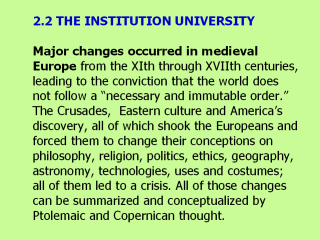 |
Who were those social agents that
provided that new knowledge? The indigenous cultures of America, the Arabs,
Jews, Chinese, Japanese, Hindus, Aztecs, Incas, and so on whose knowledge
was reevaluated by the church’s intellectuals, who had appropriated all the
information captured from the cultures conquered abroad, the same as
conquerors were stealing the material wealth of the conquered. Monastic
orders favored less rebels and answerers or “contestatarios” who were
intellectuals who discussed and distributed those new ideas; they were the
ones who gave rise to a new institution called the University. They played a
key role in the creation of the University of Paris, and spoke against the
traditional interpretation of the classic Greeks and Romans: Plato,
Aristotle, Plotino, Seneca, Virgil, Pablo de Tarso, and Gregory of Nitza.
They asserted their own interpretations, and also wrote theological
treatises, songs, and poems. Typical examples of such sects are the
“Goliards” of Pedro Abelard, who is also known as “the other stream of the
medieval times,” unexplored and innovative answerer, trying to evade
religious-theologian troubles and the “fides” of the conditioning, to open
ways to new and autonomous research. Pedro Abelard was born in Le Pallet,
France, in 1079. He was a disgruntled pupil, critical of doctrines and
mentors, and of the usage of dialectic. He occupied the Cathedral of Notre
Dame which was the first nucleus of the free university in France, and the
main center for culture both sacred and profane. He died in 1142, and his
epitaph was written by Peter “the Venerable” which read as follows:
“Socrates of France, supreme Plato of Occident, modern Aristotle, emulator
even greater than the didactics of all times; Prince of studies, famous in
the world; multiform Genius, penetrating and sharp; everything overcome with
the strength of reason and the art of words; such was Abelard.” |
